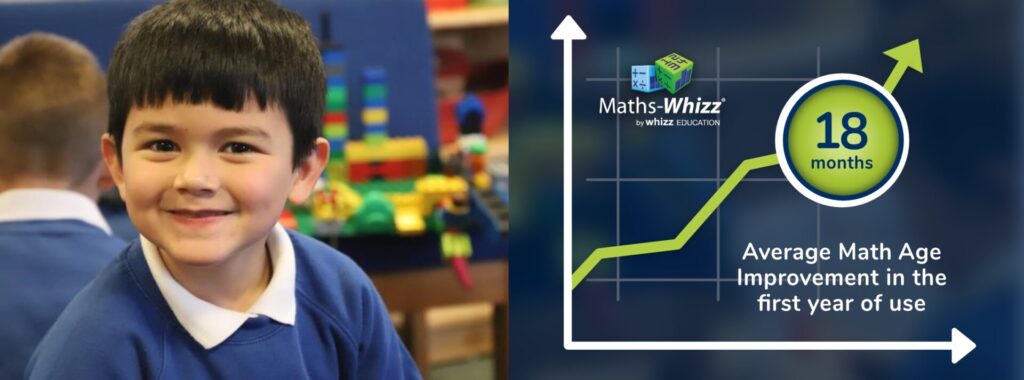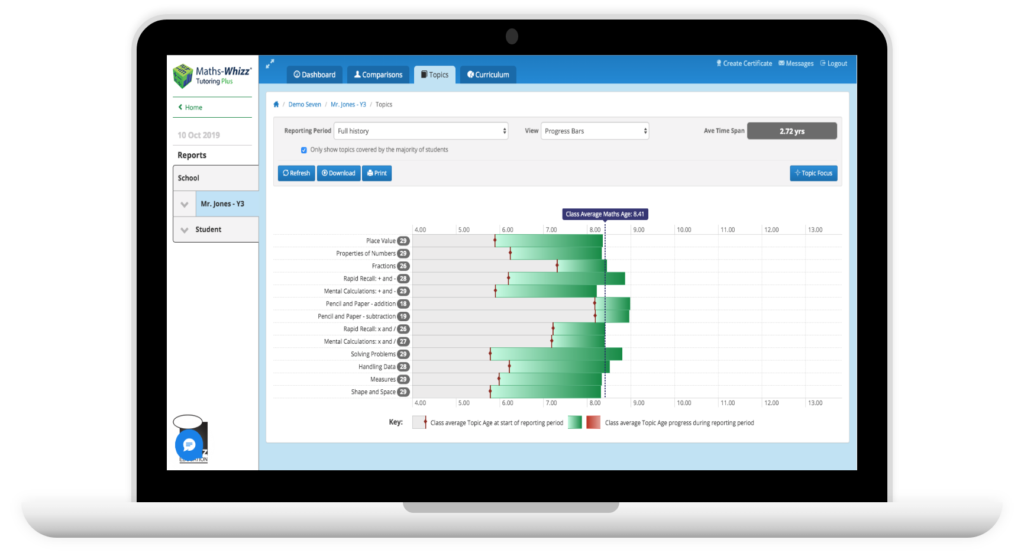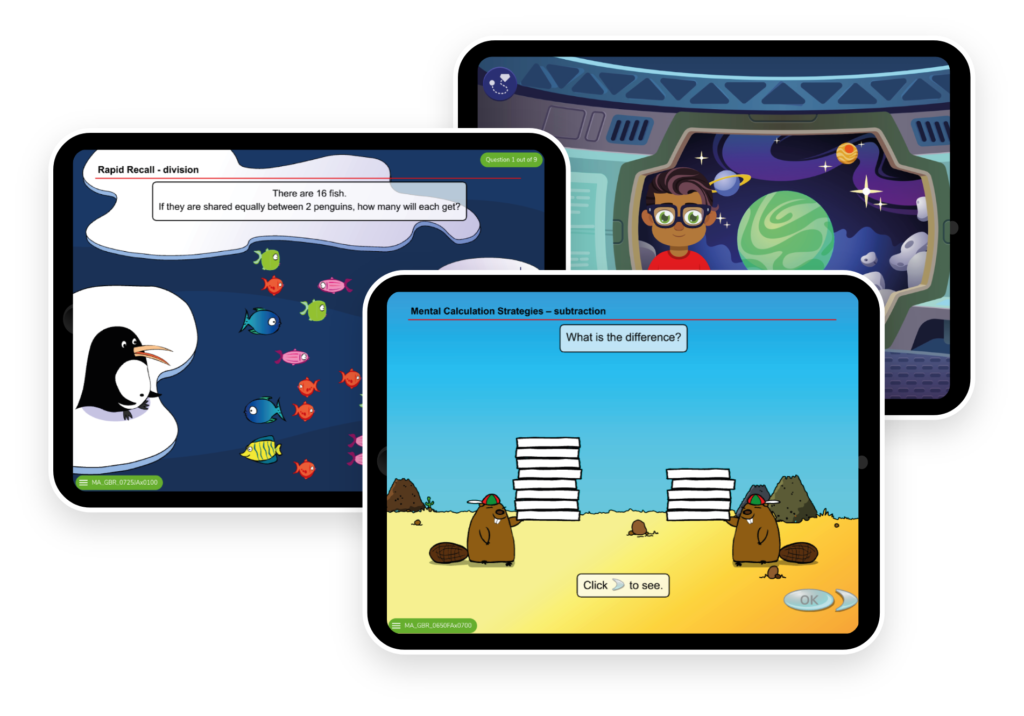
Gino Rushton – Assistant Head & Year 6 Teacher and Mandy Jones Executive Head Teacher, Criftins Church of England Primary in Shropshire.
Maths-Whizz is great at supporting blended learning
At Criftins, we all want children to achieve, we need them to believe they can, and we celebrate every step along the way. Progress is made across the whole school, not just any one year group and all staff and students contribute. We do everything we can to enable children to develop their skills, and our aim is to build an excellent learning culture to help them along their journey.
When the first lockdown hit, because we were already web-enabled, all our students had a remote school day planned from day one, and they all had access to subscriptions to extend learning. Our use of EdTech really helped, and the Maths-Whizz virtual tutor was a particular success.
Back in 2015, we’d looked at other maths EdTech programmes but selected Maths-Whizz because it offered bespoke learning. It identifies strengths and weaknesses and adapts its lessons to an individual’s pace of learning which is hugely beneficial for progression and confidence building.
Other systems on the market were a bit more ‘random’ in their selection of maths tasks, and we believe any EdTech implementation requires clarity of purpose and vision. We were particularly attracted to the data that in 12 months, pupils undertaking 60 mins of work on the virtual tutor per week can make 18 months’ progress. These were big claims, but we have genuinely seen this kind of development and improvement for students who have put in the effort and followed the programme over the past six years. An hour per week of tailored home learning added to our programme of mathematics teaching in school, and we really started to see a difference
An hour per week of tailored home learning added to our programme of mathematics teaching in school, and we really started to see a difference.

As Maths-Whizz continuously scores students, there is no pressure on our teachers to do marking
Apart from after school and breakfast clubs, we don’t use Maths-Whizz in school but for home learning in our Reception to Y6 age groups. We have a school subscription which all pupils can access independently on any device. We have worked to ensure parents know about Maths-Whizz through letters, the school app and email, and so time spent on the tutor has become a managed piece of homework. This access and parental encouragement to complete time on the virtual tutor during the lockdowns became really important.
Maths-Whizz is an individual tutor. It runs itself. This means, for teachers, there is no pressure to check or mark work. For parents juggling homeschooling and remote working, it was a ‘relief’ that they didn’t have any additional pressure to set or help with maths homework.
One of the benefits of Maths-Whizz is that it covers lots of topics. It keeps all areas fresh in students’ minds. It also challenges more able children and supports those with less ability. Two of our most able students have gone on to complete the entire programme.
To make it work well, our teachers need to monitor how much time and how many progressions have been made weekly. Progressions mean children need to have answered a high number of questions correctly. Simple graphical data enables us to see progress on a weekly, monthly, or termly basis.

Children look forward to Maths-Whizz homework as it is fun
We have found the results compare closely with our termly assessments, which we use for every year group. There is also a correlation between those children who make more use of Maths-Whizz and a good assessment – they consistently make better progress from their starting points.
Our main tips for others considering implementation would be to keep the novelty in the technology. There are interactive certificates built into the system and stickers to remind pupils to ‘keep it up’ or ‘good job’. Teachers need to keep pupils motivated by using these.
In normal term time, we have found that the novelty doesn’t wear off if we limit Maths-Whizz to home usage. Children are usually keen to do their homework because there is a fun side to the way Maths-Whizz is presented. Characters, aliens and avatars all add interest, and there is a clear format throughout. Activities such as pencil and paper happen on screen, or they might be able to use a protractor on screen. They can collect coins/points to spend in the virtual shop. For them, it’s a big deal, and their progress is rewarded with certain names like ‘Maths-Whizz Pro’ or ‘Maths-Whizz Superstar’ depending on the number of progressions. It gives them a real sense of achievement as it’s so visual.

The beauty of Maths-Whizz is that it’s so specific to the needs of each child
Teachers need to be consistent, and invest some time to monitor, track and support children. They need to set the task to spend time every week on the tutor, analyse onscreen usage and look at what’s been achieved and discuss this. The aim is to get three progressions per week which is directly linked to time spent on the system. It’s easy to monitor and pull the data quickly for review.
It’s also important to focus positively on what’s been done. One of our children achieved an impressive number of progressions in one week which was a Federation record. We contacted our Maths-Whizz partner, and he created a bespoke certificate for us to celebrate his success.
Reporting back to parents helps engagement too. Maths-Whizz enables a simple text report for parents so they can see progress broken down by topic. This is a good talking point for parents’ evenings as it’s easy to pinpoint strengths and weaknesses and shape strategies to help. Many parents ask how they can help, and because Maths-Whizz is so specific to the needs of each child, the answer is simply to ensure they access the system for at least 60 minutes per week to achieve at least two or three progressions. Then it becomes a good habit. Parents are on board as it’s not an extra burden for them.
We avoid talking about Maths-Whizz maths ages and focus on how much work has been done. Children realise this and discuss together how to achieve more progressions. It becomes like a game of how to climb higher up the ladder.
The beauty of Maths-Whizz is that it’s so specific to the needs of each child. They are not limited by what’s taught in class and essentially become masters of their own learning. If we consider the number of admin hours needed to produce this sort of individualised work and send it home, ensuring every child’s needs are met, it would be incredible. This system saves us time and ensures our students make better progress than with just class teaching alone.

